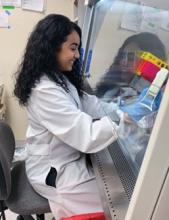 lab work at biobox at Case Western Reserve University" width="2500" height="650" />
lab work at biobox at Case Western Reserve University" width="2500" height="650" />  lab work at biobox at Case Western Reserve University" width="2500" height="650" />
lab work at biobox at Case Western Reserve University" width="2500" height="650" />
Case Western Reserve University's pre-med students study in one of the country's top medical communities.
With nationally-ranked hospitals within walking distance of campus, you'll be in the thick of advanced research and clinical care. Learn from and alongside renowned healthcare professionals, who welcome undergraduate participants on their research teams, and are ready to help you gain knowledge and experience to prepare for medical school.
of undergraduates participate in research and creative endeavors with CWRU faculty and other scholars
of CWRU undergrads who applied to medical school in the last 5 years were accepted.
(42% acceptance rate to medical school, Association of American Medical Colleges)
first-year undergraduate students offered conditional admission to CWRU School of Medicine or School of Dental Medicine through the Pre-Professional Scholars Program
undergraduate majors selected by pre-med students
Nobel Prize winners in physics, chemistry, physiology, medicine and economic science in the CWRU community
Some of the many different bachelor’s degrees recently earned by students accepted to medical school:
More than 80% of students are involved in research on campus and at leading organizations around the country and abroad, such as:

Jonathan Stamler, MD, professor of medicine
Richard Premont, PhD, associate professor of medicine, Institute for Transformative Molecular Medicine
Diabetes, artery disease and chronic hypertension. He investigated the S-nitrosylation-dependent signal crosstalk between G protein-coupled receptor and immune signaling pathways. The goal was to discover a mechanism to control the balance between too much immune activation (i.e. autoimmune disease) and not enough activation (i.e. immunodeficiency).

Paul Tesar, PhD, genetics and genome sciences, CWRU School of Medicine
Stem cell technology solutions for brain deterioration. Pelizaeus-Merzbacher Disease (PMD)—caused by mutations in a major myelin protein, proteolipid protein 1 (PLP1)—is a devastating leukodystrophy causing motor deficits, hypotonia, ataxia, cognitive impairment and early mortality. Her research in suppressing levels of mutant PLP1 may be an essential tool for generating the first universal therapeutic for patients with PMD.